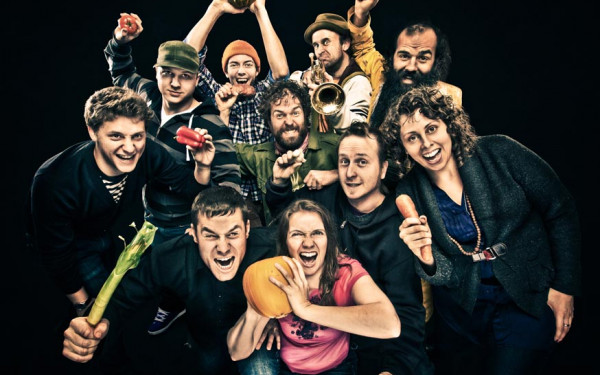Changing Islands, Keeping the Roots
Reggae Artist Face T Gets Jiggy with the Montreal Crowd
As uncommon as it may sound, Reggae artist Face-T, though raised in Jamaica, was actually born on Canadian soil and moved to Jamaica early on. He grew up on the west side of the Caribbean island in a small village of only 500 people. It was in Montreal, however, that Face-T started making music professionally.
“I didn’t really need to in Jamaica”, he explained. “Music in Jamaica is everywhere 24/7; you’re just hanging around and there’s a beat, someone around the table starts with a verse and it just goes on.”
Growing up, like most of us, he would listen to his parents’ music from the 1970s and ‘80s, but what really caught his attention was what played on the radio. “There would be different sounds and new types of music, amazing artists like U-Roy started appearing,” Face-T said. “U-Roy created a mix between rap and reggae and used very explicit lyrics, which was uncommon for Christian Jamaica, and as youngsters we were freaking out, we adored it”.
The thing Face-T and his youngster friends were freaking out about was something that came to reggae at the end of the 1970s. It was digital rhythm, and it exploded onto the reggae scene, creating new possibilities and changing the genre forever.
“Once you start getting into reggae music, the possibilities are endless,” said Face-T. “Jamaica produces the most music per capita; it’s incredible”.
As the reggae/dancehall scene exploded around the world, Face-T credits its fast circulation and growth to the Internet, enabling people from all over the world to partake in the genre’s evolution.
“Now you can go to a concert in France and they know all the lyrics, they know the artist and their history—it’s just crazy how many people find out,” he said.
In a way, Face-T admits that this has also made it harder for him to keep in touch with the Jamaican local scene. There’s just so much going on and from all sorts of places. “Now there are amazing Reggae artists from Scotland, Poland, France, all over,” he said.
For the Canadian-born star, this new diversity isn’t concerning. “My music is not for Reggae purists because the aim is not necessarily to create untainted Reggae but rather something I love that is original,” he said.
Face-T has no need for the typical stereotypes or labels; he wants to embrace every musical genre. He believes it’s interesting to meet people from all backgrounds and finds it extremely encouraging to see how many of them are interested in collaborating with reggae artists.
“Music should come naturally, but I think when you do music or paint or write, or any kind of artistic expression, to [be able to] keep on expressing yourself, you have to observe around you, take it in and put it back out,” Face-T said. He emphasized the need to keep ourselves aware of our surroundings; we shouldn’t watch TV, he said, but rather get out, travel and meet people.
Face-T will be premiering his new record, EP1, at Le Belmont on Friday, March 27. His warm, fun dancehall sounds filled with Caribbean beats and catchy lyrics will have you hooked in little time.
“My message often resonates within reggae’s main themes, such as love, unity and peace, but my aim is to get people in Canada to become more aware and open up to what’s going on in the rest of the world,” he said.Face-T’s music acknowledges the political, social and economic discrepancies that exist between Canada and Jamaica. “It’s important to be aware of all the privileges that come with being born in a rich country,” Face-T told The Link, “but usually it’s hard to get that right away.”
As the reggae artist explained, when he moved to Jamaica in 1979 there was an embargo on the country and a lot of internal rioting. “All there was on the shelves was sugar, flour, and rice,” he said. “People had nothing, no toys, no toothpaste, no nothing.”
Moving back to Canada at the age of sixteen shocked Face-T. It felt like “another world.”
Going from such poverty to a place like Montreal was very jarring, Face-T said, and it caused him to be acutely aware of the importance of balance between excess and scarcity—only if we realize that our society and our types of living are the root of this problem can we start to make the necessary changes.
Face-T describes the Montreal Reggae scene as separated in two categories. The divide is mainly between anglophones from Côte-des-Neiges or Lasalle—who are mainly Jamaicans and Caribbeans—and guys from Montreal like RiddimWise who do productions and organize evenings in the Plateau that tend to be more open to a general public.
The latter might not be “pure” reggae music, but it gives you a taste of today’s culture.
“This scene has changed a lot with the increase of French immigration to the Plateau,” Face-T said. “It’s been growing and evolving; more and more French people come to the evening shows.”
An increasing amount of small Montreal venues are closing down, causing greater synthesis of styles in the bigger venues around town. Face-T argued that this makes it harder and harder for small artists to perform since there’s no venue available to them.
“I’m very lucky because I have no problem organizing a show, but it can be almost impossible for upcoming artists!” he said. “Venues cannot be confined to the Quartier des Spectacles – it needs to be around the whole city.”
Face-T would love to see more support from different pillars of the government. Montreal’s culture is not confined, he said; it’s very open and therefore its music scene should be too.
“That’s why we love Montreal: the mix of cultures—it shows up in the music and more generally in the music scene,” Face-T said. “People from all over the world can appreciate it.”





__600_375_90_s_c1.jpg)

_600_375_90_s_c1.jpg)